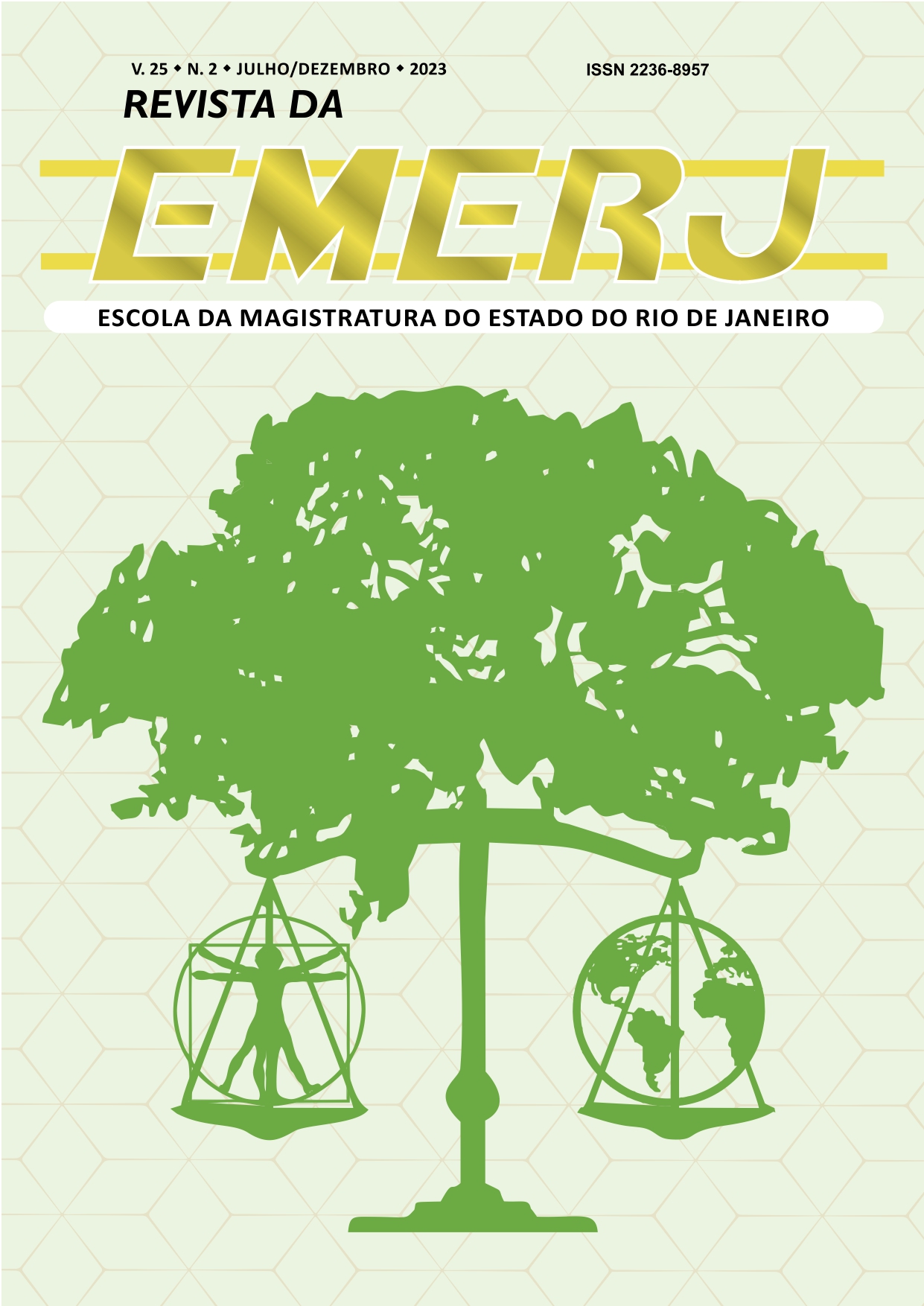Conciliation strategies in the New Procedure Code
A look through game theory
Keywords:
conciliation, self-composition, game theory, civil procedureAbstract
The New Code of Civil Procedure affirmed the principle of cooperation in several devices, especially in its art. 6th. One of the most notorious expressions of that principle is the mandatory designation of a conciliation hearing for the self-composition of the parties, pursuant to art. 334 of encoding. The concern of the new law to make procedural rules more flexible, streamline procedures and resolve cases through conciliation is based on the need to modernize the exercise of jurisdiction in the face of the current demands of society. In this way, several institutes were created by the legislator, while others are suggested by the doctrine, with the aim of fostering the conciliatory interest of the parties. However, the success of the measures, in some contexts, has still been unsatisfactory. Based on game theory, it is possible to equate the variables involved in the decision-making process of those under jurisdiction regarding conciliation, thus allowing a critical analysis of the institutes used and the suggestion of what could be changed to optimize the implementation of the legislator's political choice.
References
BACELLAR, Roberto Portugal. Sustentabilidade do Poder Judiciário e a mediação na sociedade brasileira. In: Mediação de conflitos: novo paradigma de acesso à justiça. 2. ed. Santa Cruz do Sul: Essere nel Mondo, 2015.
BRASIL. Constituição da República Federativa do Brasil de 1988. Brasília, DF: Presidência da República, [2021]. Disponível em: https://www.planalto.gov.br/ccivil_03/constituicao/constituicao.htm. Acesso em: 25 abr. 2021.
BRASIL. Projeto de Lei do Senado n. 517/2011. Institui e disciplina o uso da mediação como instrumento para prevenção e solução consensual de conflitos. Brasília, DF: Senado Federal, 2011. Disponível em: https://www25.senado.leg.br/web/atividade/materias/-/materia/101791#tramitacao_9481016. Acesso em 03/08/2023.
BRASIL. Lei n. 13.105, de 16 de março de 2015. Institui o Código de Processo Civil. Brasília, DF: Presidência da República, 2015a. Disponível em: https://www.planalto.gov.br/ccivil_03/_ato2015-2018/2015/lei/l13105.htm. Acesso em: 25 abr. 2021.
BRASIL. Lei nº 13.140, de 26 de junho de 2015. Dispõe sobre a mediação entre particulares como meio de solução de controvérsias e sobre a autocomposição de conflitos no âmbito da administração pública. Brasília, DF: Presidência da República, 2015b. Disponível em:
http://www.planalto.gov.br/ccivil_03/_Ato2015-2018/2015/Lei/L13140.htm. Acesso em: 25 abr. 2021.
BRASIL. Superior Tribunal de Justiça. Recurso Especial n. 1.135.955/SP. Processo n. 2009/0073218-3. Intervenção do advogado quando da homologação judicial. Desnecessidade. Recorrente: Caixa Econômica Federal-CEF. Recorrido: Sindicato dos trabalhadores nas
indústrias de alimentação e afins de Limeira. Relator: Ministro Teori Albino Zavascki, 12 de abril de 2011. Disponível em: https://processo.stj.jus.br/processo/revista/documento/mediado/?componente=ITA&sequencial=1051639&num_registro=200900732183&data=20110419&formato=PDF. Acesso em: 20 jul. 2023.
CÂMARA, Alexandre Freitas. O novo processo civil brasileiro. Atlas, São Paulo, 2015.
CONSELHO NACIONAL DE JUSTIÇA. Justiça em Números 2020: ano-base 2019. Brasília: CNJ, 2020. Disponível em: https://www.cnj.jus.br/wp-content/uploads/2020/08/WEB-V3-Justi%C3%A7a-em-N%C3%BAmeros-2020-atualizado-em-25-08-2020.pdf. Acesso em: 03 maio 2021.
DAN, Wei. Mediação na China: passado, presente e futuro. In: Mediação de conflitos: novo paradigma de acesso à justiça. 2. ed. Santa Cruz do Sul: Essere nel Mondo, 2015.
DIDIER JR, Fredie. Os três modelos de direito processual civil: inquisitivo, dispositivo e cooperativo. Revista de Processo, São Paulo, v. 36, n. 198, ago/2011.
ESCOLA NACIONAL DE FORMAÇÃO E APERFEIÇOAMENTO DE MAGISTRADOS. Seminário - O Poder judiciário e o novo Código de Processo Civil. Brasília, DF: Enfam, 2015. Disponível em: https://www.enfam.jus.br/wpcontent/uploads/2015/09/ENUNCIADOS-VERSÃO-DEFINITIVA-.pdf Acesso em 03 ago.2023.
HOBBES, Thomas. O Leviatã. São Paulo: Martins Fontes, 2003.
LOCKE, John. Segundo tratado sobre o governo civil: ensaio sobre a origem, os limites e os fins verdadeiros do governo civil. Coleção clássicos do pensamento político. Petrópolis: Vozes, 1994.
MOLINARI, Ernesto. Teoria dos jogos. In: BOBBIO, Norberto; MATTEUCCI, Nicola; PASQUINO, Gianfranco. Dicionário de política. 11. ed. Brasília: Unb, 1998.
PINHO, Humberto Dalla Bernardina de. O novo CPC e a mediação: reflexões e ponderações. Revista de Informação Legislativa, Brasília, v. 48, n. 190, p.219-235, abr./jun. 2011.
PINHO, Humberto Dalla Bernardina de; ALVES, Tatiana Machado. Novos desafios da mediação judicial no Brasil: a preservação das garantias constitucionais e a implementação da advocacia colaborativa. Revista de Informação Legislativa, Brasília, ano 52, n. 205, p.55-70, jan./mar.2015. Disponível em: https://www12.senado.leg.br/ril/edicoes/52/205/ril_v52_n205_p55.pdf. Acesso em: 25 abr. 2021.
PINHO, Humberto Dalla Bernardina de; DURÇO, Karol Araújo. A mediação e a solução dos conflitos no estado democrático de direito. O “juiz Hermes” e a nova dimensão da função jurisdicional. Revista Quaestio Iuris, Rio de Janeiro, v.4, n.1, p.245-277, 2011.
RIO DE JANEIRO (Estado). Corregedoria Geral da Justiça. Ementário sobre custas processuais. Rio de Janeiro: Corregedoria Geral da Justiça, 2016. Disponível em: http://cgj.tjrj.jus.br/documents/1017893/1103721/ementario-sobre-custasprocessuais.pdf?=v96. Acesso em: 03 ago. 2023.
SOUZA, Luciane Moessa de. Mediação, acesso à justiça e desenvolvimento institucional: análise histórico-crítica da legislação brasileira sobre mediação. In: Mediação de conflitos: novo paradigma de acesso à justiça. 2. ed. Santa Cruz do Sul: Essere nel Mondo, 2015.
WEBER, Max. Escritos políticos. São Paulo: Martins Fontes, 2013.
Downloads
Published
How to Cite
Issue
Section
License
Copyright (c) 2023 Thiago Ferreira Cordeiro

This work is licensed under a Creative Commons Attribution 4.0 International License.
Authors who publish in this Journal agree to the following terms:
- Authors retain copyright and grant the Journal of Constitutional Research the right of first publication with the article simultaneously licensed under the Creative Commons - Attribution 4.0 International which allows sharing the work with recognition of the authors and its initial publication in this Journal.
- Authors are able to take on additional contracts separately, for non-exclusive distribution of the version of the paper published in this Journal (eg.: publishing in institutional repository or as a book), with a recognition of its initial publication in this Journal.
- Authors are allowed and encouraged to publish their work online (eg.: in institutional repositories or on their personal website) at any point before or during the submission process, as it can lead to productive exchanges, as well as increase the impact and the citation of the published work (see the Effect of Open Access).

















